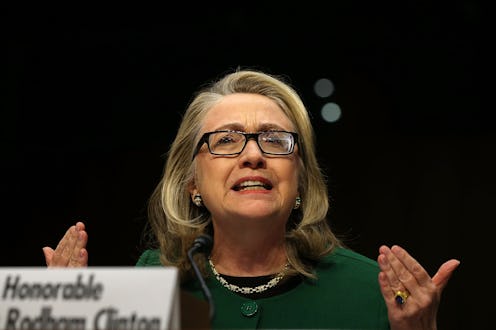News
How The New Benghazi Inquiry Could Affect Hillary
On Friday, House Speaker John Boehner announced the formation of the eighth bipartisan House committee to investigate the Sept. 11, 2012 attacks on Benghazi following the release of new emails about the incident. The GOP claims these messages represent a "smoking gun" in the White House's ploy to cover up the events of three years ago in Benghazi, Libya that left four Americans dead. And given the timing of the investigation, it's easy to wonder what effect it'll have on Hillary Clinton — Secretary of State at the time of the Benghazi attack, and expected to run for president in 2016.
Rep. Adam Schiff (D-CA) has called upon Democrats to boycott the latest controversy, calling it a "colossal waste of time." Republicans have long claimed that the White House has politicized the tragedy for its own benefit — but perhaps the GOP should consider the extent to which it is doing the politicizing.
The first revelations of administration inaccuracies and inconsistencies came in the weeks following the attack: what the White House initially called a reaction to the film Innocence of Muslims, an offensive American-made video about the Muslim prophet Mohammed, and a protest-gone-wrong was later determined to be an act of terrorism, carried out by a group of heavily armed gunmen. Republicans heavily criticized President Obama and then-Secretary of State Hillary Clinton for attempting to stage a massive cover-up to hide security and intelligence gaps about the situation in the highly volatile Middle East.
The initial Benghazi story broke a mere matter of months before the 2012 election that would decide whether Mitt Romney or Barack Obama would assume the presidency for the next four years. Given the proximity of the events to election day, it came as little surprise that Benghazi quickly became a focal point. Mitt Romney released a statement following the attacks, saying
It's disgraceful that the Obama Administration's first response was not to condemn attacks on our diplomatic missions, but to sympathize with those who waged the attacks.
Apparently, Romney missed Obama's speech in the Rose Garden immediately following the events on September 12, in which the president said,
The United States condemns in the strongest terms this outrageous and shocking attack...And make no mistake, we will work with the Libyan government to bring to justice the killers who attacked our people.
Republicans' continued use of the Benghazi issue in the months preceding the election have been condemned by Obama and Democrats, who say that the GOP concocted a conspiracy theory for the sake of political gain. It didn't work in 2012, and it seems that the Republicans are back at it again in the face of the impending 2016 election, in which Hillary Clinton will likely play a prominent role.
The issue with the "new evidence" found in the e-mail exchange is that there is nothing new to be found. Certainly, the American public has never seen this particular string of messages, and it may seem like more fodder for a conservative attack on the White House, but unfortunately, these e-mails remain in line with the same story the White House has advanced for the past 19 months. That the administration relied on CIA reports — faulty as they were — that said,
We believe based on currently available information that the attacks in Benghazi were spontaneously inspired by the protests at the U.S. Embassy in Cairo and evolved into a direct assault against the U.S. Consulate and subsequently its annex.
The new e-mails say nothing to suggest that this story was concocted by strategists in the Oval Office. Rather, it simply reinforces what we already knew: that the White House went with the original story provided by the CIA and didn't try to make itself look bad.
So why might the Republicans be so intent on revisiting old news? Might it have something to do with Hillary Clinton's seemingly inevitable bid for the presidency?
Clinton quickly became the primary target in the Benghazi scandal, with the attacks serving as perhaps the most notable blow to her credibility. And it would come as no surprise if the GOP used these e-mails and Benghazi as their main criticism of Clinton should she choose to run for president. Perhaps this is also a reflection of the levels of desperation the GOP has reached in attacking Democratic candidates — reusing not only the same techniques (though of course, mudslinging is something all parties are guilty of), but also the same storyline.
The GOP candidate pool is shallow, to say the least. An Economist/YouGov poll shows that Jeb Bush, who is considered a front-runner for the 2016 Republican ticket, only has 25 percent of Republicans supporting his presidential bid. In fact, of the three major Republican candidates, including Chris Christie and Rand Paul, none have more than 36 percent of Republicans' support. Hillary Clinton, on the other hand, can call 69 percent of Democrats her fans.
So in terms of Benghazi's effects on the Clinton campaign, it will certainly serve as mud to throw – but don't count on any of it sticking quite yet.
